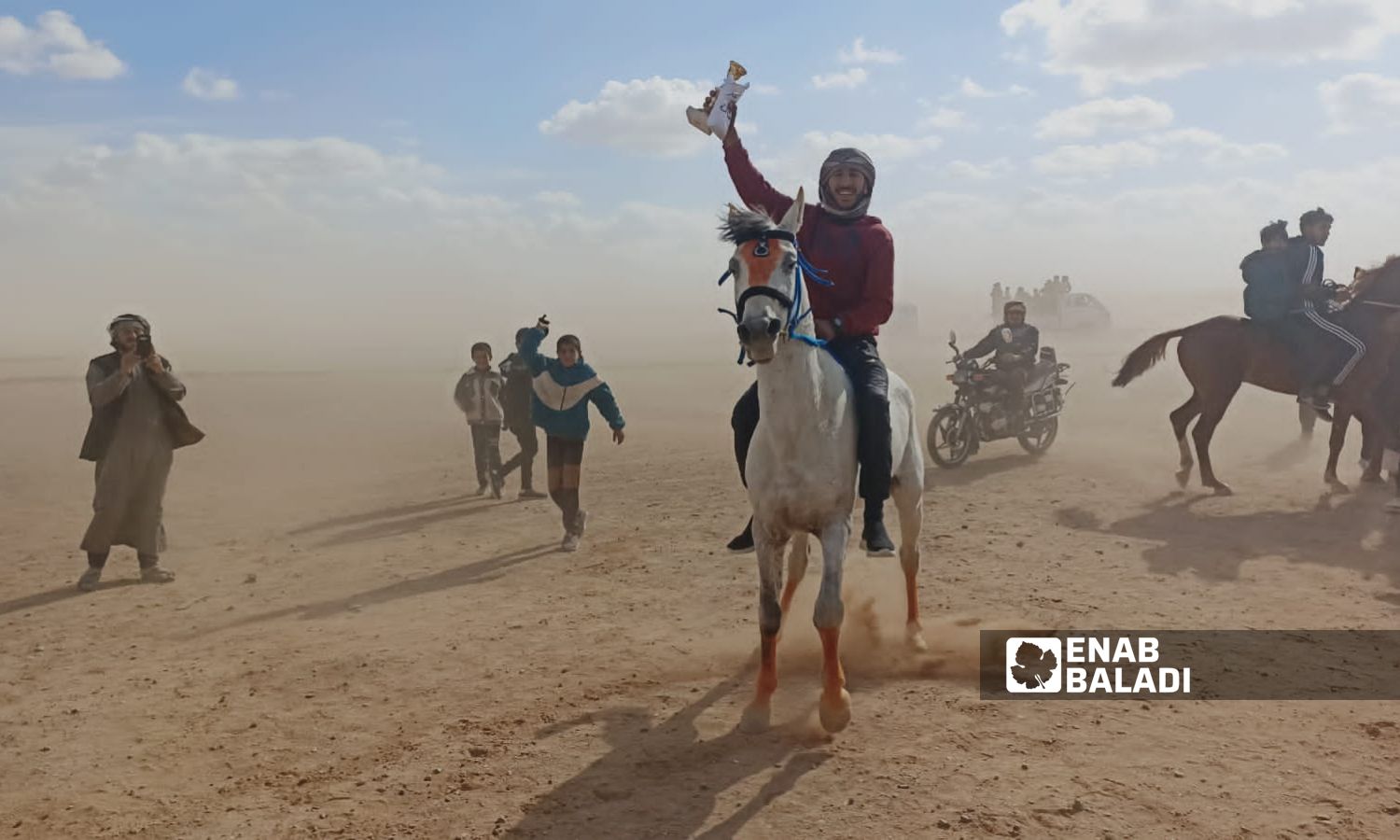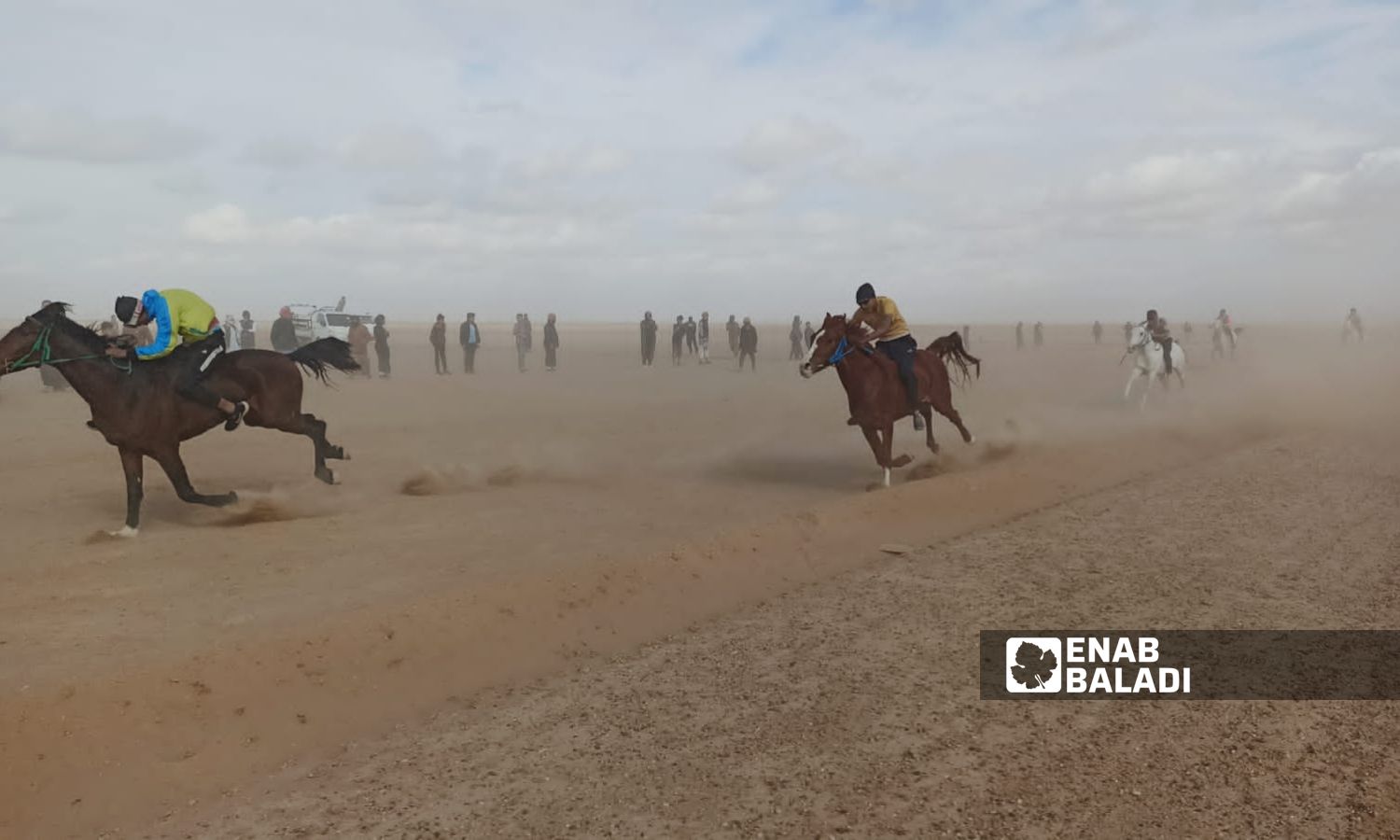



Deir Ezzor – Obadah al-Sheikh
In northeastern Syria, particularly in Deir Ezzor, breeders of horses are keen to select pure Arabian horse strains, allowing only purebred stallions to mate with purebred mares under “strict” conditions, in a profession they inherited from their ancestors.
Despite the deteriorating economic and living conditions in the area, the interest in horses and their breeds remains a priority and tradition for the people of the region, especially since Syria is considered the traditional homeland for the Arabian horse.
Breeding horses is a historical legacy in the area, and breeders and local entities organize races and festivals to showcase their pure breeds, amid repeated demands for support or securing affordable fodder.
Mohammed al-Ammar, a horse breeder in the town of al-Shafa in the eastern countryside of Deir Ezzor, told Enab Baladi that the well-known purebred horses in the region are five types (Saglawi Jadran, Abeyan Sharrak, Ma’naghi Tarbush, Kuhaylan Ajuz, and Kuhaylan al-Sabili), and the other types are branches of these.
He added that the Arabian horses are called purebred because their bloodlines are unmingled with foreign horses, and the Arabs have preserved their purity for a long time. They are characterized by strength and the shape of a broad chest cage.
He explained that the big or broad chest cage means a larger lung capable of drawing in more oxygen, and thus, the horse’s ability to run for longer distances without stopping can reach up to 150 kilometers.
He considered the existence of purebred Arabian horses a fundamental requirement in the eastern region, especially in terms of horse shows, riding methods, endurance races, and show jumping, and even for those who simply ride horses as a hobby.

A purebred Arabian horse race in the town of al-Shafa in the eastern countryside of Deir Ezzor – November 20, 2023 (Enab Baladi/Obadah al-Sheikh)
Horses are expensive compared to other animals, with prices varying according to breed, age, and gender.
Adnan Abu Arna, the host of the Horses of the Euphrates program on YouTube and a commentator at horse races in the countryside of Deir Ezzor, told Enab Baladi that 90% of horse trading relies on domestic trade and horse breeding stables, while the external trade market does not see much activity.
Horse prices range from $3,000 to $10,000, depending on the horse and its strength and breed, in addition to the rarity of its presence, like the Hadba (a strain of Kuhaylat), which is relatively rare in Syria.
Mares and fillies are in demand by breeders, with prices ranging from $4,000 to $25,000 (the dollar equals 14,000 Syrian pounds), and may reach more, according to Abu Arna.
When purchasing any horse or mare, breeders are asked to send the pedigree of the mother and father to verify their lineage, as mixed breed horses are priced much lower than purebred Arabian horses.
Competitions contribute to increasing the price of horses, as they are held not only for prizes but to showcase the abilities and heritage of the horses, which reflect their monetary value.
When a horse wins one of the running competitions or others, the status of the breeding farm where it was raised changes, and its value increases, according to Abu Arna.
Veterinarian Abdel Qader al-Sultan Eshaleeli, director of the Veterinary Union Hospital in the town of Abu Hammam in the eastern countryside of Deir Ezzor, told Enab Baladi that the hospital oversees horses prepared for races, in addition to offering services such as breeding, echocardiography, reproductive treatments, and surgeries.
Veterinarians conduct clinical examinations of the horses and suggest the appropriate ground for the race so that it does not affect the horse and the rider simultaneously, in addition to providing them with a suitable diet.
From time to time, competitions and festivals for purebred Arabian horses are held in Raqqa, al-Hasakah, and Deir Ezzor to maintain their heritage and display the existing breeds, organized by tribes or committees concerned with raising and caring for horses.
On March 1, a festival for purebred Arabian horses was held at the Equestrian City in Raqqa, with the participation of 110 horses from various regions in eastern Syria.
The festival was divided into 13 heats, and the categorization of groups was based on the ages of the horses, including three heats for horses not registered with the World Arabian Horse Organization, and the remaining ten heats were for international horses.
Stable owners, who spoke to Enab Baladi, complain about the decline in support. Before 2011, they would buy fodder, barley, bran, and others at a nominal price, and the horses would receive special support over other animals. However, currently, sufficient support is not available from the Autonomous Administration of North and East Syria (AANES).
An official in the Directorate of Agricultural Development, who preferred to remain anonymous as he is not authorized to speak to the media, told Enab Baladi that AANES supports horse breeders through associations that offer bran and barley at a price lower than the black market.
In the black market, the price of a kilo of bran reaches 2,200 Syrian pounds, while AANES offers it for 2,000 Syrian pounds, according to the official.
Horse breeders feel that the bran warehouses belonging to AANES are far from the stables, meaning that the cost of transportation is higher than the price of bran on the black market.
Syria is the traditional homeland of the purebred Arabian horse, especially the regions of the Sham desert and the Jazira region located between the Euphrates and Tigris rivers.
Arabian horses came to the region after successive migrations of nomadic tribes from Yemen, northern Najd, and the Hejaz in search of fertile lands, according to a study prepared by the World Arabian Horse Organization (WAHO) in 2002.
The migrating tribes, such as Mawali, Shammar, Jabbour, Aqeedat, and others, continued to restrict horse breeding within the tribe, making the horses of pure blood, according to the organization.
There are well-known Arabian strains still existing in Syria today, such as Kuhaylah, Seglawi, Shuwayman, Hadban, Dahman, Abayan, and Ma’naghi, but the strain’s name alone is not considered a sufficient definition, and it requires verification of the mare’s origin and purity to belong to one of these strains, then attribute it to its owner.
if you think the article contain wrong information or you have additional details Send Correction